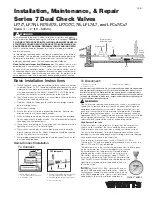
5-106
L90 LINE CURRENT DIFFERENTIAL SYSTEM – INSTRUCTION MANUAL
PRODUCT SETUP
CHAPTER 5: SETTINGS
5
ANALOG #
— This field contains the actual measurand to be sent in the response to the master. The measurands can be
mapped using elements from a list of FlexAnalog operands. The measurands sent are voltage, current, power, power
factor, and frequency. If any other FlexAnalog is chosen, the L90 sends 0 instead of its value. Note that the power is
transmitted in KW, not W. Measurands are transmitted as ASDU 3 or ASDU 9 (type identification value set to measurands I,
respectively measurands II).
Each IEC 60870-5-103 measurands list ends at the first unconfigured ("Off") value. Any measurand assigned after the first
"Off" value is ignored.
At least one measurand per ASDU must be configured in order to configure the following ASDU. For example, the user can
configure only one measurand for each ASDU, but the user is not allowed to skip ASDU 2 and configure measurands in
ASDU 3.
For any change to take effect, restart the relay.
ANALOG # FACTOR
and
OFFSET
— For each measurand included in the ASDU, a factor and offset also can be configured. The
factor and offset allow for scaling to be performed on measurands. The final measurement sent to the IEC 60870-103
master is then "a*x + b," where x is the measurand, a is the multiplying factor and b is the offset. The master has to perform
the reversed operation in order to retrieve the actual value if such scaling is done. By default a = 1 and b = 0, so no scaling
is done if these values are left at their defaults. Examples of when scaling is appropriate are as follows:
•
If the measured value contains decimals and it is important to preserve the resolution. Since the format for
transmitting the measurand does not permit decimals, a factor a>1 can be applied before transmission. For example,
a frequency F=59.9Hz can be transmitted as Ft = 10 * F = 10 * 59.9 = 599. In this case a = 10, b = 0. The master receives
599 and has to divide by 10 to retrieve the real value 59.9.
•
If the measured value is larger than what fits in the format defined in IEC 103. The format defined in the standard
allows for signed integers up to 4095. By offsetting, unsigned integers up to 4096 + 4095 = 8191 are supported.
Scaling using factors <1 can be required in such cases. The calculation is outlined in the IEC 60870-5-103 chapter of
the UR Family Communications Guide. Two examples follow, where you decide factors a and b.
Example 1
: Nominal power Pn = 100 MW = 100000 KW (power is transmitted in KW)
Since P can be both positive and negative:
Transmitted power Pt = (4095/(Pn*2.4)) * P = (4095/(100000 * 2.4) ) * P
= 0.017 * P
a = 0.017
b = 0
Pt = 0.017 * P
For a max power 100000 KW * 2.4 = 240000 KW, we transmit
Pt = 0.017 * 240000 = 4080
A value above 240 MW is indicated by overflow.
Example 2
: Nominal voltage Vn = 500000 V
Since RMS voltage V can be only positive:
Transmitted voltage Vt = (8191/(Vn*2.4)) * V - 4096 =
= (8191/(500000 * 2.4) ) * V - 4096 = 0.0068 * V - 4096
a = 0.0068
Since the step is in increments of 0.001, we round it at:
a = 0.006
b = -4096
Vt = 0.006 * V - 4096
For max voltage 500000 V * 2.4 = 1200000 V, we transmit
Vt = 0.006 * 1200000 - 4096 = 7200 - 4096 = 3104
















































